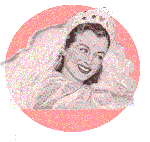- Fiction
- Epilepsy Poster Child
- by Marlena Corcoran

- Can you see me? Can you hear me? Do you feel this?
"Can I go now?"
Eleven years old. The smell of alcohol, the pinch and sting of a whole
head of needles slipped under my scalp. The sound of paper scrolling, pens
rattling.
My brain is writing a long, long story. I cannot read it. The doctor
runs it through his fingers and understands. He is not afraid. I am. The
story is a secret.
"You can't tell anybody."
My mother's face is grim. We have just arrived home from a conference
with our family physician. He'd received a report from the other doctor,
the one with the needles and the pens. The story is, I have epilepsy. Not
the kind where you fall down. The kind where you are briefly and blessedly
elsewhere. You are not here. You are not you. It's a secret.
"You can't tell any of your friends," continues my mother,
"because they'll tell their parents, and they won't let their kids
play with you."
The kids themselves would probably think I was still the same slightly
strange individual they didn't much play with yesterday. Until, of course,
their parents filled them in. Something might happen. What? Not sure. Something
bad.
"And you can't tell your father."
Well, add that to a long list.
"He feels very bad about it," said my mother. "He thinks
he gave it to you."
As well he might, given that his sister has it.
"So don't mention it."
"Your grandmother says you passed her on the street and you didn't
say hello."
I search my memory.
"She knows you saw her. You looked right at her and just walked
away."
I see my grandmother's face. My muscles do not respond. It doesn't matter.
Nothing matters. Nothing. The knowledge rises like a great cloud behind
me and settles on my shoulders. This is an illusion.
"I didn't mean it," I say. "I'll tell her I'm sorry."
What I have now, they say, is not good, but I will outgrow it. It's
not good, but it's not bad. If I don't take my medicine, it will get bad.
I will have falling-down fits and everyone will know. But this, it's not
good, but it's-nothing.
I looked at the little white pharmacist's bag, with a bottle of anti-convulsant
pills inside. Take this and be like us.
You don't like me very much, I thought.
"I'm going for a walk," I said.
My mother looked at me like she wasn't sure I was ever allowed out again.
Whether the threat was to me or to everybody else wasn't sure. But in the
end, she was always relieved to see me go.
I crossed the street on my way down to the rocks by the ocean, from
which, I had been assured, I would one day fall and drown. My body would
wash out past Gravesend Bay and into the open Atlantic, and they'd never
find me.
Rehearsing this in my mind, I narrowly escaped being run over on Third
Avenue. On the far side of the traffic was the pharmacy. The pharmacist,
I had recently learned, sold sanitary napkins. If he knew about that stuff,
maybe he knew about this, too. As I walked past the door, the pharmacist
looked at me, but didn't say anything.
On the long side window of the drug store was a brand new life-size
poster of a bride. A great white veil floated out past her shoulders, and
the bride's face inclined toward mine with the radiant certainty of the
Mother of God. The bride was blushing. Someone has told her the secret.
 The words were bright on that very first day, though their meaning
was far from clear. I had years to read it again and again, as the pharmacist
left the poster up from that day forward till the day I left home. Every
day I would stop and read the fading message: "Epilepsy is no bar
to happiness."
The words were bright on that very first day, though their meaning
was far from clear. I had years to read it again and again, as the pharmacist
left the poster up from that day forward till the day I left home. Every
day I would stop and read the fading message: "Epilepsy is no bar
to happiness."

